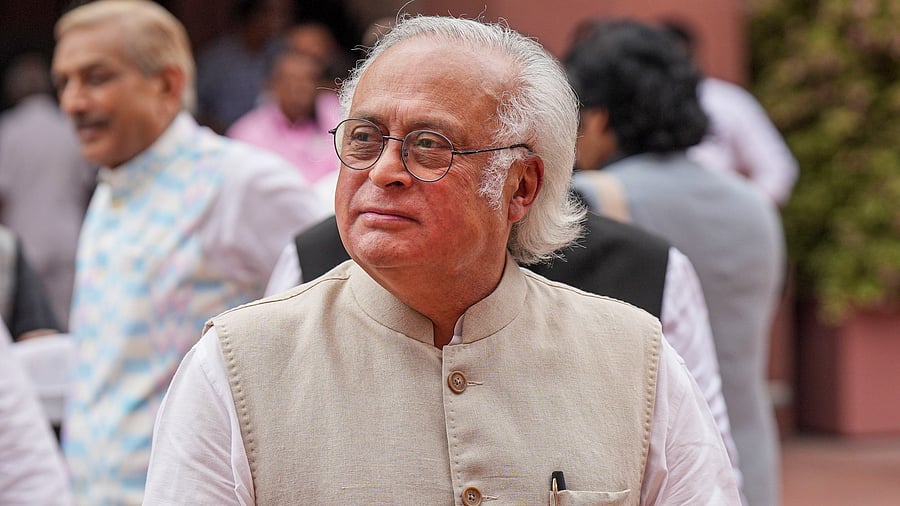
Congress general secretary in-charge communications Jairam Ramesh.
Credit: PTI Photo
New Delhi: Congress leader Jairam Ramesh on Monday said that government think-tank NITI Aayog has withdrawn a working paper on Indo-US Agriculture trade relations.
The Aayog in a working paper, titled Promoting India-US Agricultural Trade Under the New US Trade Regime, had suggested that in the aftermath of 'reciprocal tariffs' by the US, India should adopt dual-track approach and selectively reduce high tariffs on non-sensitive agricultural commodities imports from Washington, while also strategically offer concessions where domestic supply gaps exist.
"This was the NITI Aayog Working Paper on Promoting India-US Agricultural Trade Under the New US Trade Regime that was officially issued on May 30, 2025, but taken off the website a few days later and is now officially withdrawn," Ramesh said in a post on X.
When contacted, a NITI Aayog spokesperson did not offer any comment.
The working paper had noted that the sudden announcement of "reciprocal tariffs" and enhanced market access for US exports following the re-election of Donald Trump as President of the United States in January 2025 have sent shock waves across the world especially among the trading partners of the US.
"India can also strategically offer concessions where domestic supply gaps exist, such as in edible oils and nuts," the paper had suggested.
Noting that India is the largest importer of edible oil in the world and the US has a huge export surplus of soybean which is GM, the paper had said India can offer some concession to the US in import of soybean oil to meet demands in that country and reduce trade imbalance, without harming domestic production.
The paper had also suggested that India should negotiate more access to the US market for high-performing exports like shrimp, fish, spices, rice, tea, coffee, and rubber. India earns approximately USD 5.75 billion annually from agri-exports to the US. Expanding this through duty waivers or TRQs should be part of trade talks.
Meanwhile, India has hardened its position on issues related to agriculture as negotiations with the US team in Washington have entered a crucial stage, an official said on Monday.
The official also said that the stay of the Indian team, headed by special secretary in the Department of Commerce Rajesh Agrawal, is expected to be extended further.
The team is in Washington for negotiations on an interim trade agreement with the US. Both sides are rushing to close a deal ahead of the July 9 deadline for the full implementation of a 26 per cent reciprocal tariff which has been suspended since April.
"If the proposed trade talks fail, the 26 per cent tariffs will come into force again," the official added.
The stay of the Indian officials has already been extended for three days until June 30. Initially, the delegation was scheduled to stay for two days, with the talks having commenced on June 26.
Another official said that the commerce ministry has informed domestic exporters and industry that the talks are on for the first phase of the proposed bilateral trade agreement.
There would be more phases.
These talks are significant as both countries are engaged in negotiations for an interim trade deal and are trying to finalise the pact before July 9, the deadline for the expiry of the suspensions of reciprocal tariffs imposed by the Donald Trump administration on April 2.
On April 2, the US imposed an additional 26 per cent reciprocal tariff on Indian goods but suspended it for 90 days. However, the 10 per cent baseline tariff imposed by America remains in place. India is seeking full exemption from the additional 26 per cent tariff.
The US is demanding duty concessions in both agriculture and dairy sectors.
But these segments are difficult and challenging areas for India to give duty concessions to the US as Indian farmers are into sustenance farming and have small land holdings.
Therefore, these sectors are politically very sensitive.
India has not opened up the dairy sector for any of its trading partners in any free trade pacts the country has signed so far.
The US wants duty concessions on certain industrial goods, automobiles - especially electric vehicles, wines, petrochemical products, dairy, and agricultural items like apples, tree nuts, and genetically modified crops.
India is seeking duty concessions for labour-intensive sectors like textiles, gems and jewellery, leather goods, garments, plastics, chemicals, shrimp, oil seeds, grapes, and bananas in the proposed trade pact.
The two countries are also looking to conclude talks for the first tranche of the proposed bilateral trade agreement (BTA) by fall (September-October) this year. The pact is aimed at more than doubling bilateral trade to Rs 42,85,724 crore ($500 billion) by 2030 from the current Rs 16,37,146 crore ($191 billion).
Before the first tranche, they are trying for an interim trade pact.
The US team was here from June 5 to June 11 for the talks. The negotiations will continue both virtually and physically in the days to come.
India's merchandise exports to the US rose by 21.78 per cent to Rs 1,47,857 crore ($17.25 billion) in April-May this fiscal, while imports rose by 25.8 per cent to Rs 76,026 crore ($8.87 billion).